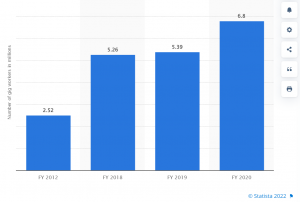
A flourishing gig economy is seen as the next big thing in the evolution of the global economy. India, the world’s fastest growing large economy with a young population and high technology adoption rates, has a booming gig economy that employs at least 77 lakh workers, according to Niti Aayog estimates for 2020-21. The number of gig workers is expected to touch 2.35 crore in 2029-30.
The rise of gig economy in India coincided with the emergence of deliver-on-demand service providers such as Zomato, Ola, Uber, Swiggy, Amazon and Delhivery. The boom has been a boon for millions of unemployed youths. India has a very high unemployment rate hovering around 10%. The phenomenon is bringing food to tables as more and more work calls emerge from tier-2 and tier-3 cities.
READ | Amid hunger index row, concerns over plummeting foodgrain stocks
The demand for gig workers sees a rise during the festive season as the country goes on a shopping spree. According to a report by Team Lease, e-commerce companies have already hired nearly 3 lakh gig workers while around 5 lakh more will be hired soon. Besides delivery executives, quick-commerce, quick service restaurants, FMCG and foot-on-street salesmen are the most in-demand roles.
Number of gig workers in India

While the gig economy saw its peak in 2019, right before Covid-19 hit, the onset of the pandemic was a nightmare for the gig workers. Things have started to settle down with life returning normalcy and e-commerce and quick-commerce picking pace again.
Gig economy and social security challenges
Gig workers can be either platform workers whose work is based on online software apps or digital platforms and non-platform workers engaged in casual work in conventional sectors. What sets gig workers apart from regular workers is the fact that they do not get work benefits such as paid leave, health insurance, and family protection, while those at the lower end of the skill pyramid bear even more heat. Businesses have been benefitting from the platform economy as it is less expensive and employers get access to a diverse pool of expertise. They have also been able to save on cost,
Several economists hail the gig economy for formalising a part of the unorganised economy. But this formalisation will be complete only when gig workers can be brought under the ambit of job security, social security and are able to earn decent wages. Sadly, most of the gig jobs are subcontracted and the only plus that gig work offers is a choice to engage in economic activities with flexible working hours. Minimum wage guarantee, however, remains elusive.
Discussions to provide gig workers with the same benefits as other employed people have been on for a while. The National Health Authority (NHA) had planned to extend health insurance cover under the Ayushman Bharat (Pradhan Mantri Jan Arogya Yojana) to gig workers as well. The need for the same emerges from the fact that these workers more often than not have unstable incomes and are vulnerable to financial ruin in the face of illness and accidents. Budget 2021 had also promised several measures to help the cause of gig workers. Most of these promises are yet to be implemented.
The government must uphold the interest of gig workers by bringing them under the social security net if India wants to benefit from the gig culture. A fair work commission needs to be empowered to investigate the gig and platform economy and to ensure that workers receive a fair pay. India also needs to emulate the West where gig workers are already deemed workers and hence are entitled to social security benefits.
READ | Ecommerce boom: India must ensure that small players too benefit
The onus is on consumers to ensure that they do not aggravate the plight of gig workers. Several instances have been reported when delivery personnel were mishandled due to late delivery or because of them coming from a particular caste or community. Companies must proactively work towards sensitising not only employees but also their clientele regarding the hardships faced by gig workers.
Niti Aayog has come up with a series of recommendations to support India’s gig workers based on a survey. The report calls for specially designed institutional credit products, cash flow loans by FinTechs, unsecured loans to first-time borrowers from the platform economy, and access to formal credit for women and disabled people.
